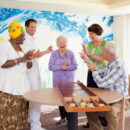Brain Exercises That Promote Mental Sharpness in Older Adults
Your brain is more adaptable than you think, and keeping it sharp doesn't require complicated programs or expensive tools. This guide breaks down proven techniques that older adults can use to boost memory, improve focus, and maintain cognitive health through enjoyable daily activities. Explore creative exercises, lifestyle habits, and realistic strategies that make staying mentally sharp both achievable and rewarding.

Ever walk into a room and forget why you went there? Or struggle to remember the name of that neighbor you’ve known for years? You’re not alone. These moments happen to everyone, but as we age, they can become more frequent and more concerning.
The good news? Your brain is far more adaptable than you might think. Just like your muscles respond to physical exercise, your mind thrives on mental workouts. With the right activities and habits, you can keep your cognitive abilities sharp, vibrant, and reliable for years to come.
What Really Happens to Your Brain as You Age
Let’s be honest about aging. Your brain does change over time. You might notice that names don’t come as quickly, or that juggling multiple tasks feels more challenging than it used to. These changes are completely normal—they’re part of the natural aging process, not a sign that something’s wrong.
However, there’s an important distinction between normal age-related changes and serious cognitive decline. While forgetting where you put your keys is frustrating but typical, significant memory loss that interferes with daily life may signal conditions like dementia or Alzheimer’s disease, and should be addressed with your health care provider.
The encouraging truth is that regular brain exercises can help you maintain cognitive function and potentially delay more serious decline. Think of it as preventive medicine for your mind.
Why Mental Exercise Matters More Than You Think
When you challenge your brain with new activities, something remarkable happens. Your brain cells form new connections, creating stronger pathways for information to travel. This process, called neuroplasticity, continues throughout your life—meaning you’re never too old to build a sharper mind.
Regular mental stimulation doesn’t just help you remember better; it can lead to an improved attention span, boost problem-solving skills, and even enhance your overall quality of life. The key is consistency rather than intensity.
Simple Daily Activities That Make a Real Difference
You don’t need expensive equipment or complicated programs to exercise your brain. Some of the most effective activities are things you can easily incorporate into your daily routine:
Reading transforms your mind. Whether it’s the morning newspaper, a mystery novel, or magazine articles about topics that interest you, reading expands your vocabulary and strengthens memory pathways. The act of following a story or absorbing new information keeps multiple brain regions active.
Writing clarifies your thinking. Try keeping a journal about your daily experiences, or write letters to family members. Even making detailed grocery lists or jotting down thoughts about books you’ve read helps organize your mind and improve clarity.
Games aren’t just fun—they’re brain food. Crossword puzzles, Sudoku, jigsaw puzzles, and board games all challenge different cognitive skills. Chess sharpens strategic thinking, while word games boost vocabulary and verbal fluency.
Conversations are cognitive workouts. Regular discussions with friends, family, or neighbors exercise your memory and verbal abilities. Sharing stories, debating current events, or simply catching up with loved ones stimulates multiple brain functions simultaneously.
The Lifestyle Connection
Sharp mental functioning isn’t just about brain games. Your overall lifestyle plays a crucial role in cognitive performance. The choices you make every day either support or hinder your brain’s ability to function at its best.
Nutrition matters tremendously. Foods rich in omega-3 fatty acids, antioxidants, and vitamins directly support brain health. Being physically active each day increases blood flow to the brain, delivering the oxygen and nutrients your neurons need to thrive.
Sleep quality affects everything from attention to memory consolidation. When you don’t get enough rest, your brain struggles to form new memories and clear out toxins that accumulate during the day.
Stress management is equally important. Chronic stress and high blood pressure release hormones that can damage brain cells over time. Finding healthy ways to relax and unwind protects your cognitive abilities.
Memory-Boosting Exercises That Actually Work
Memory exercises don’t have to be boring or feel like homework. Try these tips to improve cognitive function:
Challenge yourself to remember shopping lists without writing them down, or practice recalling the details of conversations you had earlier in the day. Start small—maybe remembering three items—and gradually increase the challenge.
Use association techniques. When meeting someone new, connect their name to something memorable about them or someone else you know with the same name. These mental connections make recall much easier.
Practice visualization. When learning new information, create mental images that help you remember. The more vivid and unusual the image, the better your brain will retain it.
Creative Activities That Spark Your Mind
Creativity isn’t just for artists—it’s brain medicine. Engaging in creative activities stimulates multiple brain regions simultaneously, building connections that support overall cognitive health.
Art projects like painting, drawing, or crafting require planning, visual processing, and fine motor skills. These activities strengthen hand-eye coordination while providing a satisfying creative outlet.
Music offers unique cognitive benefits. Learning to play an instrument or singing exercises memory, rhythm, and emotional processing. Even listening to music actively—paying attention to different instruments or lyrics—engages your brain in meaningful ways.
Writing stories or poems about your experiences helps organize memories and stimulates imagination. You might start by writing about your childhood, career experiences, or family traditions. This process strengthens neural pathways while creating something meaningful for future generations.
Gardening combines physical activity with mental stimulation. Planning a garden layout, remembering watering schedules, and learning about different plants all challenge your brain while providing the additional benefits of outdoor time and physical movement.
Cooking engages multiple cognitive processes. Following recipes exercises working memory, while adapting dishes or trying new cuisines challenges problem-solving skills. The sensory experience of cooking—smells, textures, and tastes—also stimulates brain regions associated with memory.
Building Habits That Support Brain Health
The most effective brain exercise program isn’t about occasional intense sessions—it’s about building sustainable daily habits that support cognitive ability and brain health over the long term.
Stay socially connected. Isolation and loneliness can accelerate cognitive decline. Join clubs, volunteer for causes you care about, or participate in community activities. Regular social interaction provides cognitive stimulation while supporting emotional well-being.
Move your body regularly. Physical exercise doesn’t just benefit your heart and muscles—it’s one of the best things you can do for your brain. Aim for at least 150 minutes of moderate exercise per week. Walking, swimming, cycling, or yoga all support brain health by improving circulation and reducing inflammation.
Prioritize quality sleep. Most adults need 7-9 hours of sleep per night. Develop a consistent bedtime routine, avoid screens before bed, and create a comfortable sleep environment. Good sleep consolidates memories and clears metabolic waste from your brain.
Eat for brain health. Include plenty of fruits, vegetables, whole grains, and healthy fats in your diet. Foods like blueberries, fatty fish, nuts, and leafy greens provide nutrients that specifically support cognitive function. Stay hydrated—even mild dehydration can affect concentration and memory.
Practice mindfulness. Meditation, deep breathing exercises, or simply spending quiet time in nature can reduce stress and improve focus. These practices help your brain process information more effectively and maintain emotional balance.
Modern Tools for Ancient Minds
Technology offers new ways to exercise your brain. Apps like Lumosity, Elevate, or Peak provide structured cognitive training programs. While these digital tools can be helpful, they work best when combined with real-world activities and social interaction.
Don’t overlook traditional options either. Crossword puzzle books, Sudoku collections, and board games remain effective because they’ve stood the test of time. Many libraries offer puzzle groups or game nights where you can combine brain exercise with social interaction.
Consider joining a reading club or enrolling in lifelong learning courses. Many communities offer classes specifically designed for older adults, covering everything from history to technology to learning a new language. Learning new skills or exploring new subjects keeps your mind flexible and engaged.
Realistic Expectations and Consistent Progress
Brain exercises won’t stop aging or guarantee prevention of cognitive decline, but they can significantly slow the process and improve your quality of life. The key is setting realistic expectations and maintaining consistency.
Most people notice improvements in focus and memory within a few weeks of regular practice. However, the goal isn’t to achieve perfect recall or eliminate all age-related changes. Instead, aim to maintain your cognitive abilities and enjoy the mental stimulation that comes with learning and growth.
Remember that small, consistent efforts often yield better results than sporadic intensive sessions. Even 10-15 minutes of daily brain exercise can make a meaningful difference over time.
Your Path Forward
Maintaining mental sharpness as you age isn’t about perfection; it’s about staying engaged with life, learning new things, and challenging yourself in enjoyable ways. The activities that work best are often the ones you genuinely enjoy, so experiment with different options until you find what resonates with you.
Whether you prefer crossword puzzles or cooking classes, reading novels or learning to paint, the important thing is to stay mentally active. Your brain will thank you for the investment, and you’ll likely find that the journey of keeping your mind sharp is as rewarding as the destination.
Start today with one small change. Read an article about something that interests you, call a friend you haven’t spoken to in a while, or try a new recipe. Your future self will appreciate the effort you put in now to maintain a sharp, vibrant mind for years to come.
About Koelsch Communities
Koelsch Communities offers a wide range of “Mom-approved” senior living options designed to create fulfilling and enjoyable experiences. With over 60 years of experience, we have built a reputation for providing top-quality care and exceptional living environments. Our communities are staffed by professionals dedicated to treating our Ladies and Gentlemen with respect and providing the special attention they need.
We pride ourselves on our high customer satisfaction, which reflects our commitment to excellence. Our experienced team ensures that every resident feels valued and cared for, promoting a thriving and supportive community atmosphere.
For more information about our senior living options and to discover how we can help you or your loved one enjoy the finest living experiences, please contact us today. We look forward to welcoming you to our community and helping you find the perfect senior living solution.
Disclaimer: This article is for informational purposes only and does not constitute medical, legal, or financial advice. It’s recommended to consult with a medical, legal, or financial professional for your specific circumstances.









